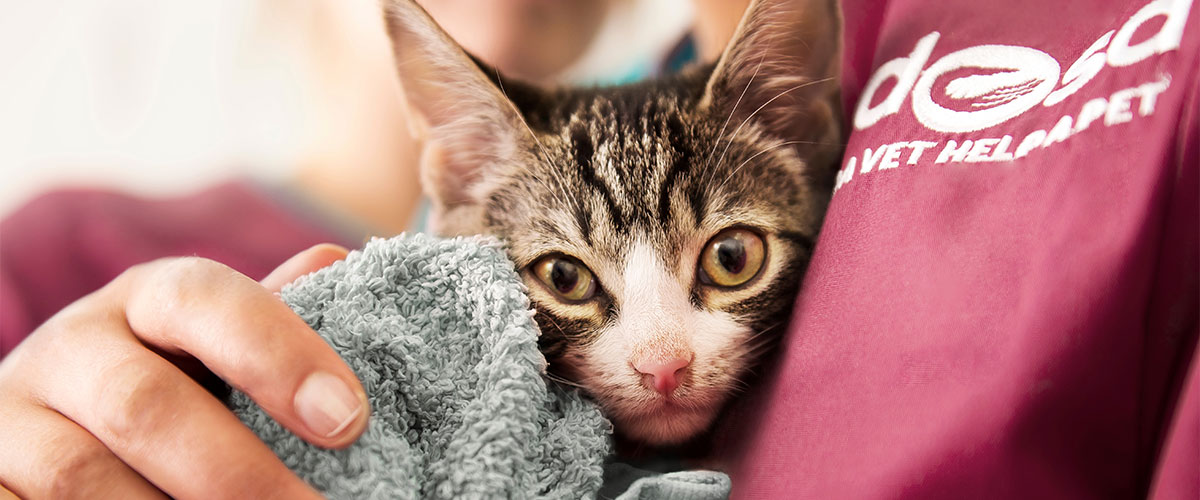Heart murmurs in cats
Overview
- A heart murmur is a whooshing noise caused by abnormal blood flow inside the heart.
- There are a few different conditions that can cause a heart murmur in a cat.
- Not all heart murmurs are problematic, some (such as innocent flow murmurs) are harmless.
- If your cat has been diagnosed with a heart murmur, it’s important to find out what’s causing it, decide on a treatment plan (if necessary), and monitor him/her closely.

A heart murmur is an unusual ‘whooshing’ noise in the heart that can be heard alongside the heart’s usual ‘lub-dub’ sounds. Murmurs are caused by turbulent (abnormal) blood flow in the heart. Some murmurs (such as innocent flow murmurs) are harmless, but some (such as those caused by heart disease and high blood pressure) indicate a problem. Your vet can check your cat for a murmur by listening to their chest with a stethoscope.
Causes
Some of the common conditions that cause heart murmurs in cats include:
- Heart disease - such as hypertrophic cardiomyopathy/HCM (the most common type of heart disease in a cat), congenital heart disease (a heart problem a kitten is born with) or a valve problem.
- Anaemia - anaemia (low numbers of red blood cells in the blood) and blood loss, often change how the blood flows and can cause a murmur.
- High blood pressure - high blood pressure can cause a murmur because it speeds up blood flow around the body.
- Hyperthyroidism - hyperthyroidism (an overactive thyroid gland) causes the heart to beat harder and faster than usual, which can result in a murmur.
- General illness - if your cat is severely dehydrated, or has a high temperature, they may develop murmur while they are ill.
- Pregnancy - some cats develop a murmur during pregnancy. This rarely causes a problem and the murmur usually disappears once the cat has given birth.
- Innocent flow murmurs – innocent flow murmurs are harmless murmurs caused by very fast flowing blood inside the heart. Flow murmurs are common in kittens while they are growing, and usually disappear by 4-6 months of age. If your kitten has a flow murmur that remains after 6 months of age, your vet may recommend some investigations to check for other causes.
Grades
Vets grade heart murmurs based on how loud they are. Your cat’s murmur will either be classified as ‘low/moderate/high intensity’, or given a number from 1-6 (1 being the quietest, and 6 being the loudest). Loud murmurs tend to indicate more serious problems, and quiet murmurs less serious problems, but this isn’t always the case. For example:
- A minor problem can sometimes cause a loud murmur
- A major problem can sometimes cause a quiet murmur
- Some perfectly heathy cats have heart murmurs
- Some cats with heart disease don’t have a murmur (especially in the early stages).
If your cat has a murmur or heart disease, your vet will often want to them regularly to see if there are any changes.
Symptoms
If your cat has a heart murmur, it’s likely that your vet will ask you to monitor for other related symptoms such as:
- Breathlessness and mouth breathing
- Low energy (lethargy)
- Weakness
- Weight loss
- Changes in appetite
- Collapse
- Swollen abdomen
- Pale gums
- Vomiting
- Coughing
Treatment and investigations
The treatment your cat needs will depend on the cause of their murmur. If your cat has a very quiet murmur, but is otherwise well, your vet may initially suggest monitoring him/her to see if anything changes. However, if your cat has a loud murmur, seems unwell, or your vet is suspects an underlying problem, they may suggest investigations such as:
- X-rays
- An ultrasound scan
- An ECG (a heart trace)
- Blood tests
It can be worrying if your cat is diagnosed with a murmur, but not all heart murmurs are a sign of a problem - some cats live with a murmur their whole lives without any issues.
Heart murmurs in kittens
All new kittens should have their heart checked by a vet. Murmurs in kittens are rare, but do sometimes occur. There are two types of heart murmurs that can occur in young kittens:
- Innocent flow murmurs - harmless murmurs that tend to resolve without treatment by 4-6 months of age (more information above). If your vet suspects your kitten has an innocent flow murmur, they will probably suggest monitoring them to make sure it resolves/doesn’t get any worse.
- Murmurs caused by congenital heart disease - congenital heart disease is a heart problem that your kitten is born with. If your vet suspects your kitten has congenital heart disease, they will probably suggest further investigations to look for the cause.
Published: March 2021
Did you find this page useful?
Tell us more
Please note, our vets and nurses are unable to respond to questions via this form. If you are concerned about your pet’s health, please contact your vet directly.
Thank you for your feedback
Want to hear more about PDSA and get pet care tips from our vet experts?
Sign up to our e-newsletter
Written by vets and vet nurses. This advice is for UK pets only. Illustrations by Samantha Elmhurst.

